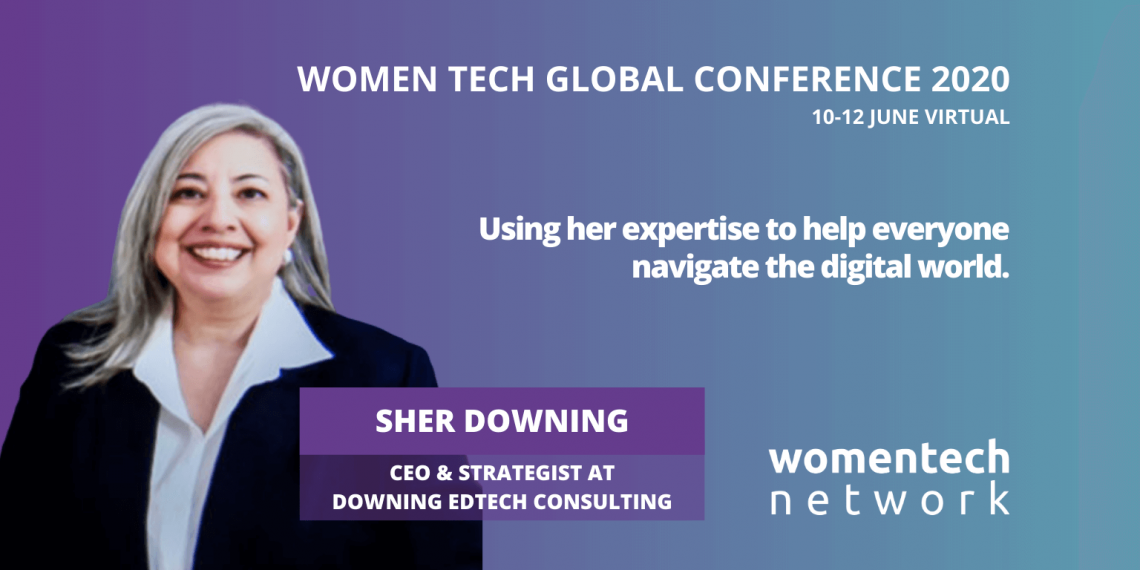
Dr. Sher Downing, CEO & Founder of Downing EdTech Consulting serves as an EdTech Strategist who brings clarity to the relationships of technology, education and people. With over thirty years of experience in higher education, her industry expertise serves as the platform for helping business and educational organizations with strategic planning and development for virtual offerings and coaching for EdTech startups and CLO's. Downing is also an international and national presenter, author, and regular media contributor.
Especially for the WomenTech Network, Sher agreed to give an interview to one of our Global Ambassadors, Alexandra Kodjabachi.
“Q&A”
-
What does it mean to have a “humanistic experience” at the intersection of education and technology?
It means we have to acknowledge the purpose for developing technological advances ultimately is impactful to the human race. So it’s important that the significance of developing and designing includes how people will interact. We often discuss personal use versus work application, however, the truth is we have reached a time where we interact with technology throughout our daily lives regardless of our role. That difference no longer means it exists for a specific purpose but for the experience and outcomes.
That is the intersection and requires us to understand that all people come to technology from different backgrounds, vantage points, skill sets, and access; it means we must create opportunities for adoption with all levels of users in mind. And, we must create a positive environment that encourages and embraces each to understand how they may use technology to stay in contact with family and friends or to successfully run a business or their home life at a click. For many, it provides resources, access to supplies, schooling, and medical feedback when they have limitations due to health reasons, mobility, or a disability.
I start with that background as our goal should be simple; rather than to continue to create more evolutions of the same product, we should look to see how that product is adopted and create alternative solutions for those who aren’t part of that group. We should embrace the characteristics that create an experience and examine how to recreate that in a tool or app. We should look at how we can bring more individuals together in a capacity that provides opportunities in a variety of ways.
For example, our recent pandemic moved many people to conferencing software for the first time. While more adopters will go forward, many felt the experience was difficult to maneuver, the experience did not feel as comforting as being face to face with an individual.
So while we continue to discuss how to learn to adapt to this type of technology, we’re seeing little discussion in how the technology can adapt to us.
Little has been written on why people have identified with the feelings they have in their experience. It’s an opportunity to gain this data and begin to look at what creates an atmosphere and experience that meets the humanistic qualities we all want in our daily lives.
I believe we have a distinct opportunity to learn, to grow, and to adapt to embrace everyone in how they learn and how they experience our world and their daily interactions.
-
What are your 3 pieces of advice about learning and working digitally in the 21st century?
1. Create learning opportunities for yourself.
While you may certainly pursue traditional education either onsite or online, you must constantly be an evolving learner. You should be taking free courses, paid courses, webinars, certificates of completion - anything that will expand your toolkit but more importantly, your knowledge. You should remain vigilant about constantly challenging yourself so you have options when opportunities arise. And in a new world of remote workers, opportunities which have never before been available may come into focus over the next few years.
2. Identify how to contribute new and alternative ways to work digitally.With the pandemic many individuals began to work from home. Some jobs were easy to move to remote access others were not requiring people to split their time between an office and home. We work diligently and in an emergency we figured out how to do the same things we were accomplishing in the office at home. But is it the right thing? Done the right way? This is an opportunity to work with your staff and your boss to analyze what you’ve been doing and to suggest better solutions or alternatives to create more synergy, better outcomes, and more contribution. It’s a time to allow us to think about how we perform and how we can make things better for everyone.
3. Create your knowledge circle.It is wonderful to have friends, but it’s imperative you have mentors or people who understand your goals and focus. It’s a great time to have a digital group who bring experience and expertise to share; learning from others is just as important as learning from books and courses. Surround yourself with people who nurture your ideas, who hold the tough conversations with feedback, and who believe in you; they provide the best learning experience.
-
With what mindset do we need to explore the “post-covidian” era?"
We want to embrace opportunity. We will likely never be the same as we were before the virus. What it does afford us is to reevaluate how we live, learn, and function in society. For those in the edtech space, it offers the chance to create and invent new ideas and concepts.
We want to understand how to live safe and still have ways to experience life. We want to adopt technology that will ease our efforts, create new ways to live and learn, and identify what changes we’ll make in our lives that maybe were needed anyway. I hope people will begin to embrace life, use technology as an assistant but also recognize the power they have to spend time away from it.
I hope as a society we recognize by helping others we directly or indirectly help ourselves through a humanistic approach, a chance to view the world through someone else’s perspective, and to recognize that together we are so much more than apart.
We have wonderful edtech startups who have the option to change how we live, to adapt what we do, and to bring some happiness to all levels of users and learners if they embrace the post-covidian era and take the lead in helping everyone with alternatives.

You’re enjoying this interview thanks to our devoted Global Ambassador
Alexandra Kodjabachi. Alexandra is the Founder and CEO of PersEd, a training, coaching and consultancy enterprise for personal education and 21st century learning. She is a Young Global Changer 2017, an UNLEASH talent 2018 and an UNESCO APCEIU Youth Leader 2019.

